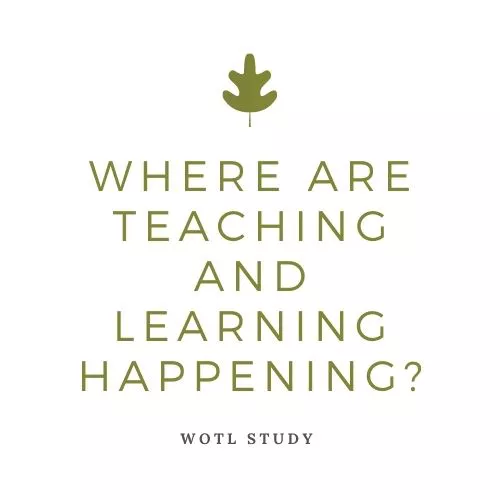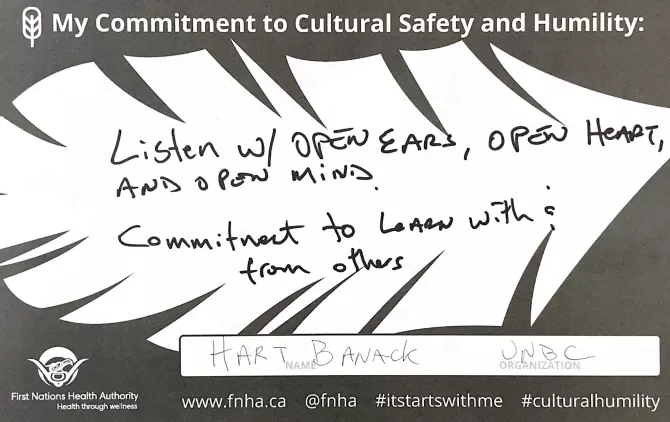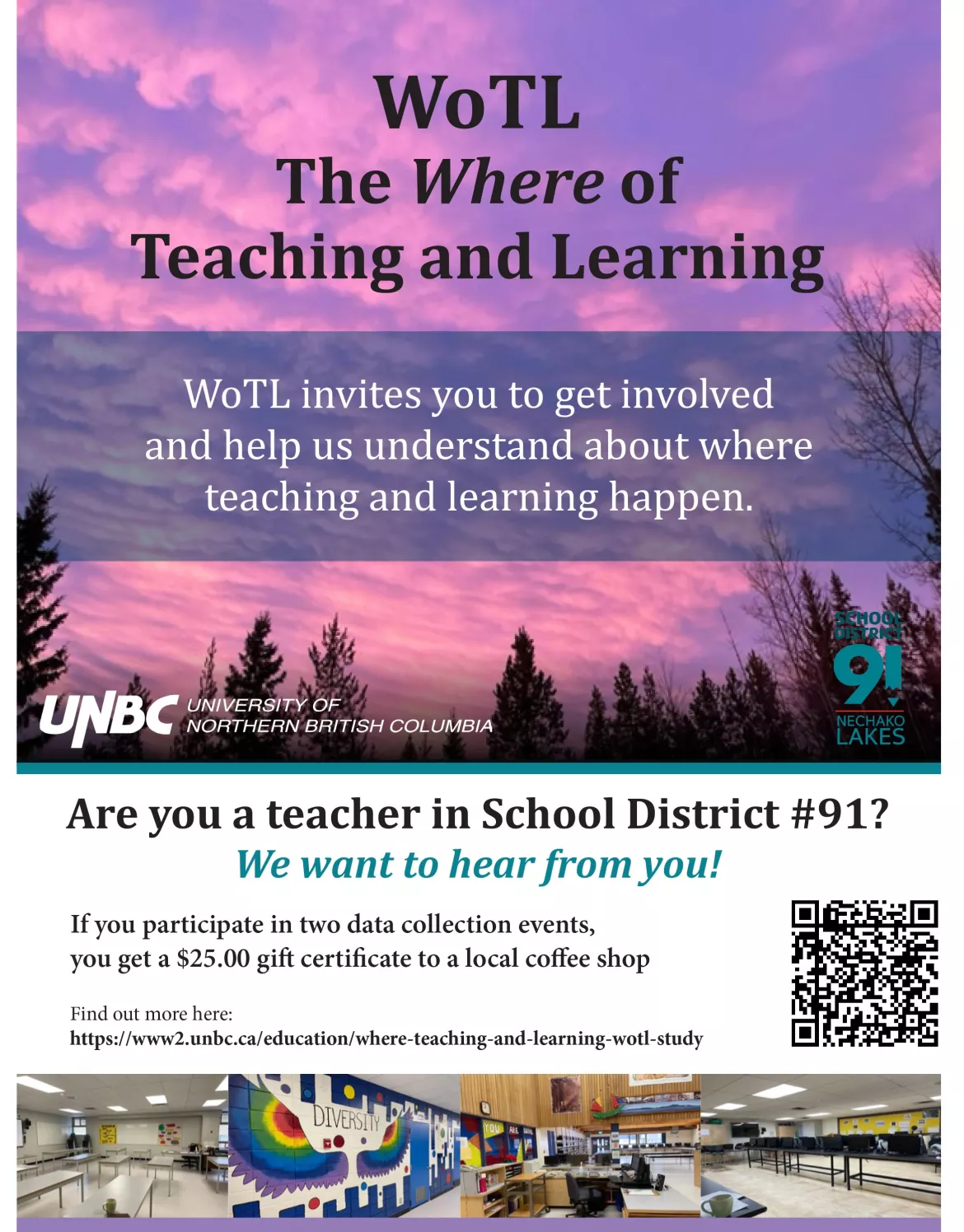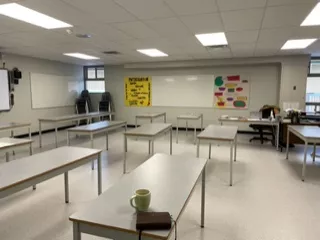The Where of Teaching and Learning: an ethnographic survey of practices from the field

You are invited to join a study around where learning and teaching occur. Very little is known about how educators decide where learning experiences occur. This project aims to shed light on the decision-making processes of educators, the experiences of learners, and the relevance of considering where when planning learning.
Lheidli T’enneh hubeh keyoh whuts’odelhti. Nts’ezla hubeh yun ts’uwhut’i, ts’uzt’en ink’ez ts’unuwhulyeh.
(Translation: I respectfully acknowledge the unceded, ancestral lands of the Lheidli T’enneh, on whose land we live, work, and play.)
Note: Study participation is currently only available in School District 91 and School District 57.
- Land Acknowledgement and Cultural Safety
- How to Get Involved
- WoTL Study Details
- UNBC Health and Safety
- Consent Forms
- Frequently Asked Questions
- Qualitative Research Symposium Events
- About the Researchers
- Contact Information
- Social Media
Land Acknowledgement and Cultural Safety
UNBC Traditional Territory Acknowledgement
Since time immemorial, Indigenous peoples have walked gently on the diverse traditional territories where the University of Northern British Columbia community is grateful to live, work, learn, and play. We are committed to building and nurturing relationships with Indigenous peoples, we acknowledge their traditional lands, and we thank them for their hospitality. The Prince George campus is situated on the unceded traditional territory of the Lheidli T’enneh First Nation, part of the Dakelh (Carrier) peoples' territory.
Complete Traditional Territory Acknowledgement
School District 91 Land Acknowledgement
We are grateful to live, work, and play on the unceded, ancestral territories of fourteen First Nations Representing the Dakelh, Nedut'en, and Wet'suwet'en peoples. We are working diligently towards creating equity for our learners through conscious acts of Reconciliation.
Thank you to Leona Prince
School District 57 Land Acknowledgement
We are grateful to be working and learning on the unceded ancestral lands of the Lheidli T’enneh First Nation, McLeod Lake Indian band and Simpcw First Nation, each of whom have been part of these lands for at least 9 000 years. We honour and respect these beautiful ancestral lands, cultures and people through the work we do with our communities. On Lheidli T’enneh’s ancestral lands we honour them in their Dakelh dialect: Lheidli T’enneh hubeh keyoh whuts’odelhti. Nts’ezla hubeh yun ts’uwhut’i, ts’uzt’en ink’ez ts’unuwhulyeh. We respectfully acknowledge the unceded ancestral lands of the Lheidli T’enneh, on whose land we live, work and play.
SD57 Land Complete Acknowledgement
Additional resources
Northern Health Indigenous Health: Cultural Safety
First Nations Health Authority
First Nations Education Steering Committee
First Peoples Principles of Learning
Commitment to Cultural Safety and Humility

Dr. Hartley Banack
Listen with open ears, open heart and an open mind; commitment to learn with and from others.
How to get involved
Find out more information about this study below:
Pre-recorded information session
Teachers (K-12)

Teachers who wish to be a part of the study will participate in one or more of the following data collection events:
- Complete an online survey (10-15 minutes, one time, plus reviewing the consent information letter).
- Partake in a 30-60-minute open-ended interview (in-person or online, one-time). Indicate in the online survey your interest in participating.
- Track where you taught, using the Day Reconstruction Method, over 10 school days (two weeks) for approximately 15 minutes after each school day, using an online recording tool (total time =150 minutes, ongoing over two weeks). Indicate in the online survey your interest in participating.
- Host a researcher to join your class for 1 half-day in-person observation (2-3 hours). Indicate in the online survey your interest in participating.
During in-person interviews, snacks and a drink will be provided. If you participate in the online survey and at least one other data collection event listed above, you will receive a $25.00 gift certificate to a local coffee shop. Even if you decide to withdraw later, you will still receive the gift certificate
WoTL Study details

We want to learn more about where learning is happening (classrooms, school grounds, gym, online, etc.). This study examines where teaching and learning occur by following teaching and learning in the K-12 school system, and choices around where learning experiences are situated. In this project, where means where learning is occurring, for example the classroom, the gym, the schoolyard, the computer lab, etc. We are interested in hearing stories from teachers and non-teachers about how they perceive where aspects of the learning they either plan or participate in. The project aims to shed light on how distinct where choices may impact learning, health and wellness, connections to the natural world, and life experience.
Objectives
Educators continue to prioritize what is learned (curriculum), who/how learning happens (pedagogy), and the when learning is appropriate (subject disciplines and grades). In response to the insistence around where learning and teaching take place, this study aspires to create an inventory of evidence for where learning actually happens in B.C. K-12 schools. This project represents the first comprehensive review on the where of teaching and learning in Canada.
Research questions
- Where is learning occurring?
Sub-research questions

- How are decisions around where learning occurs taken?
- How are experiences and engagements in distinct where learning contexts expressed?
- How do participants make sense of knowing in distinct where contexts?
- What relationships exist between curricular and pedagogical choices in relation to where decisions?
- What affordances do distinct where contexts offer teaching and learning?
- How are decisions around where learning occurs assessed and evaluated with respect to the quality of the learning and the learning aims?
UNBC Health and Safety
For information on the ongoing measures UNBC is taking to prevent the spread of all communicable diseases, please refer to this link:
Consent Forms
If you take the online survey, you must complete a consent form below. If you have any questions, please contact us.
Teacher Consent and Information Form
Please note: this study has REB approval until November 2023. The REB number for this study is E2021.1105.054.00.

Frequently asked questions
Can I share the WoTL website with other SD91 and SD57 educators?
Yes, please share the link and steer them towards the research team, if they have questions.
Are you looking at if teaching is taking place outside of the classroom? Would you include online spaces as well?
The use of “where” is meant to be broad and include many different physical, emotional and other senses. “Where” includes: school building and rooms (classrooms, libraries, gymnasiums, computer labs, etc)., virtual sites (websites, Zoom, Teams, etc.), feelings (daydreaming, moods, etc.), memories, and books, films and music (which are often described as moving one to another place). We can even be in two “wheres” at once (e.g. in the computer lab and visiting a website or in a Zoom call), but this is just a sample list. There are many other “wheres”, and we hope this project helps to reveal them.
What is going to be done with the research/data once you are done with the study?
Once the data from the SD 57/91 study has been gathered, it will be analyzed and connected to existing research and theory in the area of “where” learning and teaching occur. Two papers will be developed. One will be a scholarly paper, which will be submitted to an academic journal and conference, and the other will be directly towards practitioners and published in a local teacher journal and presented at a B.C. teacher conference. If you wish to stay involved with WoTL, you can indicate interest in the Online Survey (you are asked to provide an email address, if you wish to stay informed).
What made you choose SD91 and SD57 instead of any other school district?
SD #91 and SD#57 has long-standing connections with the UNBC School of Education. As the project was developing, Hart Banack was talking with colleagues in SD#91 and SD#57 and they expressed interest in being involved. So, a research relationship was born!
Do you hope to look at including post-secondary schools in this study?
WoTL focuses on K-12 teachers, but has opportunities for others to get involved and share their “where” stories. When you begin the survey, there are various options to indicate how you identity your role in relation to the survey. If the pre-determined roles do not make sense to you, you can enter a role of your choice.
Qualitative Research Symposium Events
Purpose: A place for qualitative graduate students to come and talk about their research. This is an open invitation for anyone who would like to discuss their research, ask any questions they may have, or just want to get to know other people and strengthen their connection with other qualitative researchers at UNBC.
List of Events:
- November 2, 2022: Making qualitative "sense" of your research question
- February 8, 2022: Methodologies
How to Get Involved:
- Watch for emails from NBCGSS.
- Look for posters around the school.
- Email hart.banack@unbc.ca to be put on an email list.
About the researchers
Dr. Hartley Banack
Dr. Hartley Banack is an Assistant Professor in the School of Education at the University of Northern British Columbia. His emerging research program brings together his training and expertise in critical pedagogy, environmental education, outdoor learning, social justice, and teacher education.
Tobi-Dawne Smith
Tobi-Dawne Smith is a student at UNBC who is completing their Ph.D. and is a Research Assistant on this project.
Contact information
For more information please email Dr. Hartley Banack at hart.banack@unbc.ca or call 250-960-5317.
If you have any concerns or complaints about your rights as a research participant and/or your experiences while participating in this study, call the Office of Research and Innovation at 250-960-6735 or email reb@unbc.ca.
Social media
Follow us on social media: